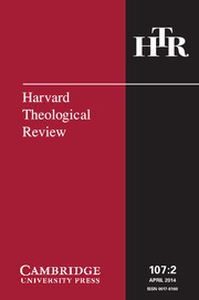 What the Harvard Theological Review giveth, it evidently will not taketh away.
What the Harvard Theological Review giveth, it evidently will not taketh away.
The venerable publication about religious matters is refusing to retract a 2014 article by a noted scholar of early Christianity despite evidence that the article — about Jesus’s wife — was based on a forgery.
The paper, by Harvard theologian Karen King, described a Coptic papyrus called “The Gospel of Jesus’s Wife,” which, among other things, includes language that suggests Christ was married:
The dialogue concerns family and discipleship. Jesus speaks of “my mother” and “my wife” in lines → 1 and 4, and line → 5 refers to a female person who is able to be Jesus’s “disciple.”
As the Boston Globe reported today,
King was persuaded the scrap of papyrus was probably a fake after the Atlantic magazine published an extensive investigative piece last week profiling the owner, a Florida man named Walter Fritz, whose identity King kept confidential.
Yesterday, the dean of Harvard Divinity School, David Hempton, released a statement on the matter, which provides a bit more background:
The June 15, 2016 issue of The Atlantic Monthly published an article entitled The Unbelievable Tale of Jesus’s Wife. The article called into question the provenance and authenticity of a papyrus fragment, purportedly stating “Jesus said to them, My wife” that is the subject of research by Professor Karen King of Harvard Divinity School.
Reached for comment by The Boston Globe after publication of the Atlantic article, Professor King was quoted as stating that “It appears now that all the material [owner Walter] Fritz gave to me concerning the provenance of the papyrus … were fabrications.”
On June 16, 2016, The Atlantic published an interview with Professor King by the same author, in which Professor King stated that the Atlantic‘s investigation “tips the balance towards forgery” and that the preponderance of the evidence now presses in that direction.
The mission of Harvard Divinity School, its faculty, and higher education more generally is to pursue truth through scholarship, investigation, and vigorous debate. HDS is therefore grateful to the many scholars, scientists, technicians, and journalists who have devoted their expertise to understanding the background and meaning of the papyrus fragment. HDS welcomes these contributions and will continue to treat the questions raised by them with all the seriousness they deserve.
However, the journal issued a statement about the article, a cop-out of — bear with us — Biblical proportions:
Harvard Theological Review has scrupulously and consistently avoided committing itself on the issue of the authenticity of the papyrus fragment. HTR is a peer-reviewed journal. Acceptance of an essay for publication means that it has successfully passed through the review process. It does not mean that the journal agrees with the claims of the paper. In the same issue (HTR 107:2, April 2014) in which HTR published Professor Karen King’s article and the articles on the testing that were represented or misrepresented in some circles as establishing the authenticity of the fragment, it also published a substantial article by Professor Leo Depuydt arguing that it was a crude forgery. Given that HTR has never endorsed a position on the issue, it has no need to issue a response.
Like Retraction Watch? Consider making a tax-deductible contribution to support our growth. You can also follow us on Twitter, like us on Facebook, add us to your RSS reader, sign up on our homepage for an email every time there’s a new post, or subscribe to our new daily digest. Click here to review our Comments Policy. For a sneak peek at what we’re working on, click here.
Jesus wept. (the shortest verse in the Bible, or so I’m told…)
Rather confirms that theology is indeed a branch of fiction. Fiction not being science isn’t “retractable.” One wouldn’t retract the bible, nor commentary on it. Amen.
Theology, as an academic discipline, is no more fiction than anthropology, etc.
I don’t have the impression from this article that the author is asking for a retraction. I’m not certain I agree that the journal should necessarily retract the paper contrary to the author’s wishes… this seems like the sort of thing that can easily be handled by follow-up articles which point to the forgery, and therefore the original article’s worthlessness.
However, I would think that Prof. King would be asking for a retraction, knowing what she now knows. Then the journal should comply with a retraction.
The author herself has not forged anything. While I accept it is highly probabale, that the scrap manuscript was faked, there alsways remains a slight residue of uncertainty in these things. Since when did controversial minority positions need to be culled in science? Lies and fabrications yes, but genuine differences of opinion that just might be true, however improbable? It is not as if anyone could be fooled into accepting this as an accepted majority position – and as the journal correctly states that was already the case from the very beginning. What is there to retract? Nernst’s far fetched idea about the origin of matter has never been formally retracted.
To paraphrase Twain; If you don’t read the HTR you’ll be considered uniformed; If you do read it you will be misinformed.